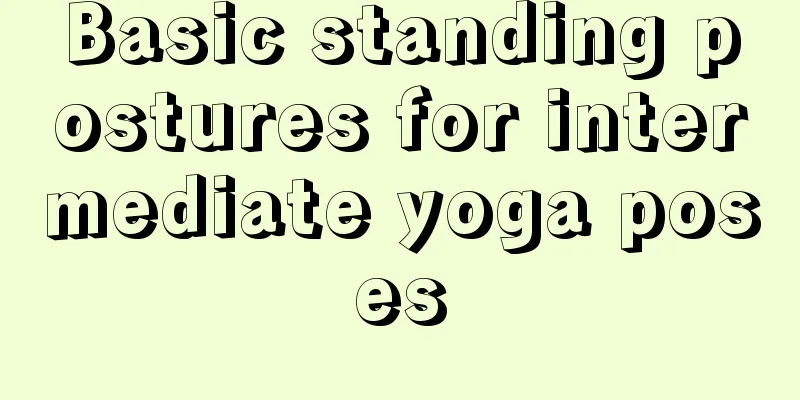Basic standing postures for intermediate yoga poses

|
Intermediate yoga poses are a kind of continuous movements. They are not a combination of rigid postures. They focus on the balance between the bodies and let your mind keep up with the movement of the limbs. When practicing intermediate yoga poses, you need to disperse the weight of your whole body to various parts of your body. To make it easier for everyone to understand, today I will introduce to you what the basic standing posture is. 1. Mountain pose 1 Basic stance: Put your feet together or open to shoulder width, with toes pointing forward; tighten your abdomen, lift your chest and head, and place your arms at your sides. Inhale, lift your arms to the sides of your body and hold them above your head, with your arms close to your ears and extending upward infinitely, with your fingers crossed and your palms facing each other; Exhale, bend your elbows, turn your wrists, and face your palms upward; Inhale, straighten your arms, and stretch your upper arms close to your ears upward infinitely. At the same time, lift your heels, put your soles on the ground to bear the weight, straighten your legs, and do not exert force on your waist; take a deep breath and maintain the posture. Exhale, bend your elbows, and turn your wrists so your palms are facing each other; at the same time, lower your heels back to the mat. Inhale and straighten your arms. Exhale and return your arms to your sides. Stand in a relaxed position. Exhale, bend your elbows, turn your wrists so your palms are facing each other, and at the same time, lower your heels back to the mat; Inhale and straighten your arms. Exhale and return your arms to your sides. Stand in a relaxed position. 2. Tadasana II Basic stance: Feet slightly apart, toes pointing forward; Inhale, lift your arms to the sides of your body and hold them above your head, with your arms close to your ears and extending upward infinitely, with your fingers crossed and your palms facing each other; Exhale, bend your elbows, turn your wrists, and face your palms upward; Inhale, stretch your arms, put your upper arms close to your ears and extend them to infinity, raise your head and look at your hands; take a deep breath and maintain the posture. Note: Stretch your arms, straighten your back, put your center of gravity on your feet, and do not exert force on your waist. Inhale, raise your head, and look forward; Exhale, bend your elbows, turn your wrists so your palms are facing each other Inhale and straighten your arms. Exhale and return your arms to your sides. Stand in a relaxed position. There are many standing postures for intermediate yoga poses. This article only introduces two of them. The movement descriptions are concise and easy to read, and it is also easy to learn these movements. Taking advantage of your free time, you can complete these movements at home. Once you master the most basic movements, you will be able to learn more advanced movements in the future. |
<<: Benefits of having a personal yoga trainer
>>: How to do yoga for beginners
Recommend
What fitness equipment can help you lose weight?
Weight loss is the most popular service in today&...
What should you pay attention to when running after fitness
The most common place for fitness is the gym, whi...
How long after a meal should you brush your teeth?
The main issue is how long to brush your teeth af...
What are the precautions for mountain climbing in summer?
Hiking in the suburbs is a very good choice in su...
Can I do yoga to lose weight while breastfeeding?
Can we do yoga during breastfeeding? Some people ...
What is the most effective exercise for losing weight in the gym?
Nowadays, people's health awareness is gettin...
What are the precautions for mountain climbing?
Many people like mountaineering because it is a k...
Is it good to practice yoga in the morning?
Many people have the habit of getting up early, s...
Yoga methods that are good for the spine
Many times in life there are some bad sitting pos...
Benefits of Spinning Cycling
Do you all go to the gym on a regular basis? Espe...
How to do aerobic exercise weight loss program?
All obese people have deeply realized that losing...
This weekend "indulgence" is not a waste of life
Modern people work long hours. If you don’t do an...
What are the most effective height-increasing yoga exercises?
I don’t know if it’s because of the environment o...
What is the best time to run at night?
Some office workers sit in the office every day a...
How long after giving birth is it best to practice yoga?
After giving birth, women’s bodies will change to...









